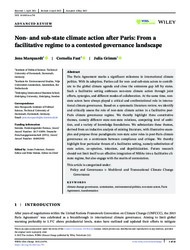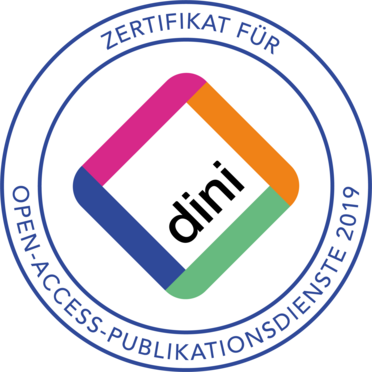Non‐ and sub‐state climate action after Paris: From a facilitative regime to a contested governance landscape
DOI: https://doi.org/10.1002/wcc.791
Persistent URL: http://resolver.sub.uni-goettingen.de/purl?gldocs-11858/10384
Persistent URL: http://resolver.sub.uni-goettingen.de/purl?gldocs-11858/10384
Marquardt, Jens; Fast, Cornelia; Grimm, Julia, 2022: Non‐ and sub‐state climate action after Paris: From a facilitative regime to a contested governance landscape. In: Wiley Interdisciplinary Reviews: Climate Change, Band 13, 5, DOI: 10.1002/wcc.791.
 |
Dokument öffnen: |
The Paris Agreement marks a significant milestone in international climate politics. With its adoption, Parties call for non‐ and sub‐state actors to contribute to the global climate agenda and close the emissions gap left by states. Such a facilitative setting embraces non‐state climate action through joint efforts, synergies, and different modes of collaboration. At the same time, non‐state actors have always played a critical and confrontational role in international climate governance. Based on a systematic literature review, we identify and critically assess the role of non‐state climate action in a facilitative post‐Paris climate governance regime. We thereby highlight three constitutive themes, namely different state‐non‐state relations, competing level of ambition, and a variety of knowledge foundations. We substantiate these themes, derived from an inductive analysis of existing literature, with illustrative examples and propose three paradigmatic non‐state actor roles in post‐Paris climate governance on a continuum between compliance and critique. We thereby highlight four particular threats of a facilitative setting, namely substitution of state action, co‐optation, tokenism, and depoliticization. Future research should not limit itself to an effective integration of NSSAs into a facilitative climate regime, but also engage with the merits of contestation.
This article is categorized under:
Policy and Governance > Multilevel and Transnational Climate Change Governance Three constitutive themes—different state‐non‐state relations, levels of ambition, and knowledge foundations—define the multiple roles non‐ and sub‐state actors can occupy in the post‐Paris climate governance regime. Yet, calls for voluntary, collaborative, and synergetic non‐state climate action in a facilitative post‐Paris climate governance setting run the risk to overshadow fundamental tensions when governing climate change.
Statistik:
ZugriffsstatistikSammlung:
Schlagworte:
climate change governancecontestation
environmental politics
non‐state actors
Paris Agreement
transformation
This is an open access article under the terms of the Creative Commons Attribution License, which permits use, distribution and reproduction in any medium, provided the original work is properly cited.

